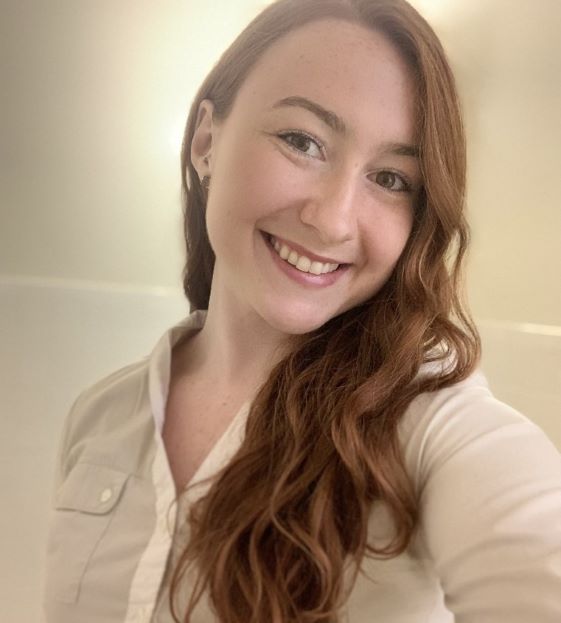Congratulations to Courtney McDermott, a Ph.D. student in Dr. Manny DiCicco-Bloom’s lab, on receiving the prestigious NIH Blueprint Diversity Specialized Predoctoral to Postdoctoral Advancement in Neuroscience (D-SPAN) Award. Courtney is the first Neuroscience student at Rutgers University to achieve this award!
We asked Courtney to discuss her current research and goals, and share her grant application experience:
Why did you choose Rutgers for your graduate training?
My decision to pursue a PhD in Neuroscience at Rutgers was due to two major factors: 1) Rutgers has a central research focus on autism, an area I have professional and personal motives for pursuing in my own independent neuroscience career, 2) I received exceptional mentoring from Dr. DiCicco-Bloom when I spent a summer in his lab as part of the R25 NIH-funded Neuroscience Summer Undergraduate Research Program (NeuroSURP). In addition, Rutgers is one of the most ethnically diverse institutions of higher education in the United States. The School of Graduate Studies is a recipient of the National Institute of General Medical Sciences Initiative for Maximizing Student Development (NIGMS IMSD) training grant, which provides 1:1 mentoring and professional development support to students from disadvantaged backgrounds, like myself.
Which graduate program are you enrolled in, and who is your advisor?
I am a doctoral candidate in the Neuroscience & Cell Biology graduate program. My primary mentor is Dr. Emanuel DiCicco-Bloom, who is a Professor in Neuroscience and Cell Biology/Pediatrics at Rutgers Robert Wood Johnson Medical School and Fellow of the American Association for the Advancement of Science. I am also co-mentored by Dr. Martin J. Blaser, who holds the Henry Rutgers Chair of the Human Microbiome and serves as Professor of Medicine and Pathology & Laboratory Medicine, and as Director of the Center for Advanced Biotechnology and Medicine.
What are you currently working on, and why is your research important?
I am currently investigating how changes in the diversity and abundance of microorganisms in the gut (microbiota) affect the development of the brain. My dissertation project models Dr. Blaser’s recent publication, which identified cephalosporin antibiotic exposure during the first two years of life as an environmental factor associated with increased onset of autism. While it is known that antibiotics perturb the gut microbiome, it is currently unknown whether an antibiotic-induced perturbed microbiome alters brain development, perhaps contributing to autism pathogenesis. To address this research gap, I am investigating the gut-microbiome-brain axis in the 16p11.2 microdeletion genetic risk mouse model of autism. This research is important because it is among the first to investigate how environmental factors associated with autism interacts with genetic vulnerabilities to alter the gut-microbiome-brain axis. It has important clinical significance to the autism community, given the common use of antibiotics in childhood and strong association of the 16p11.2 microdeletion with autism. In turn, future studies can investigate causal mechanisms and perform rescue experiments that may ultimately lead to the development of novel therapeutics for individuals with autism.
Which fellowships and grants have you received as a graduate student?
I wrote my first graduate training grant at the conclusion of my first year of graduate studies, which resulted in becoming a TL1 fellow of the NIH-funded New Jersey Alliance for Clinical and Translational Sciences (NJACTS) inaugural cohort. I also submitted and received a 2-year predoctoral fellowship through the New Jersey Governor’s Council for Medical Research and Treatment of Autism. I was recently awarded the NIH Blueprint and BRAIN Initiative Diversity Specialized Predoctoral to Postdoctoral Advancement in Neuroscience (D-SPAN) F99/K00 Award, which provides funding for the remaining 2 years of my graduate studies and up to 4 years of funding for my postdoctoral training.
How has this funding helped you to succeed in your research?
The three-year TL1 training program transformed me into an interdisciplinary scientist by providing me with monthly professional development meetings, networking opportunities with other TL1 fellows across the nation, and annual retreats where I presented my research. In addition, receiving the 2-year predoctoral fellowship through the New Jersey Governor’s Council for Medical Research and Treatment of Autism was a true milestone in my research development. This fellowship required me to identify gaps in the field that my research proposal could address, sharpening my critical thinking and grantsmanship skillsets. It also provided additional funds for me to examine the effects of antibiotic exposure on neural gene expression. Lastly, the F99/K00 award will have a tremendous impact on my research career. This grant supports the pre- to post-doctoral transition of diverse graduate students and provides career development opportunities to enhance the success rate in becoming an independent neuroscience researcher. As a result, I will be in a strong position to leverage and integrate all of my training to investigate multiple facets of autism pathogenesis as an independent neuroscience investigator, which is my long-term career goal.
What advice would you like to share with students who may be applying for fellowships and grants?
Start as early as possible and be kind to yourself throughout the process! Writing can be challenging but it can also be rewarding. Make sure to review the program announcement/ request for applications in full detail and ensure that you meet eligibility criteria before you apply. For training grants, it is critical to identify the gaps in your own skillsets (conceptual, intellectual, technical) and discuss how you can address them in the training plan section of the proposal. I would also highly recommend working with your advisor or mentoring team to receive guidance and feedback throughout the process. Lastly, try not to take any rejections or criticisms personally! The ability to respond to criticisms is one of the greatest lessons I learned during the grant writing process. It truly helped me grow as a scientist.

Congratulations again, Courtney! For more information on the NIH D-Span Award (F99/K00) visit the NIH website.